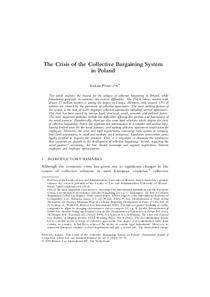The crisis of collective bargaining system in Poland

The International Journal of Comparative Labour Law and Industrial Relations
2019
35
1
March
57-77
collective bargaining ; labour relations ; social partners ; collective agreement ; labour law
Collective bargaining
http://www.kluwerlawonline.com
English
"The article analyses the reasons for the collapse of collective bargaining in Poland, while formulating proposals to overcome the current difficulties. The Polish labour market with almost 17 million workers is among the largest in Europe. However, only around 15% of workers are covered by the provisions of collective agreements. The most striking feature of the system is the lack of multi-employer collective agreements including sectoral agreements. The crisis has been caused by various legal, structural, social, economic and political factors. The most important problems include the difficulties affecting the position and functioning of the social partners. Paradoxically, there are also some legal solutions which deepen the crisis of collective bargaining. Polish law regulates this phenomenon in a complex and unclear way, leaving limited room for the social partners, and making collective agreements unattractive for employers. Moreover, the strict and rigid requirements concerning trade unions at company level limit negotiations in small and medium-sized enterprises. Legislative intervention seems legally justified to improve the situation. First, it is important to eliminate the regulations that constitute an obstacle to the development of collective bargaining. Second, respecting the social partners' autonomy, the law should encourage and support negotiations between employers and employee representatives. "
Digital
The ETUI is co-funded by the European Union. Views and opinions expressed are however those of the author(s) only and do not necessarily reflect those of the European Union or the ETUI.